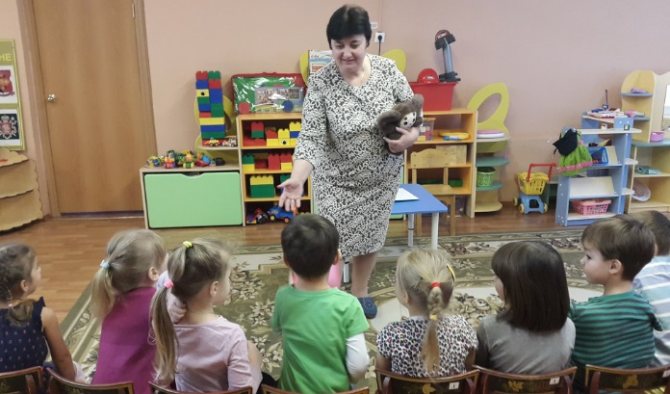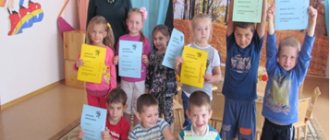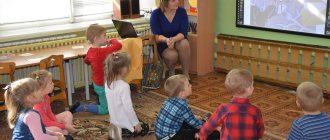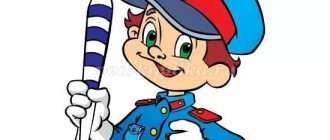Sample outline of a lesson on the topic “Getting to know the street”
Goal: to expand children’s understanding of the roadway of the street, to give knowledge about one-way and two-way traffic, and the dividing strip. Introduce some rules for the movement of pedestrians on the street, the concepts of “crossing” and “pedestrian”.
Children's speech as a means of communication: stages of development and functions
Necessary materials: plot pictures, a “Pedestrian crossing” sign, a card with a picture of a traffic light, colored pencils for each child.
The lesson begins with a warm-up, which is carried out to the poetry of S. Mikhalkov.
I roll on two wheels (they go in a circle one after another),
I twirl two pedals (they walk, raising their knees high),
I hold on to the steering wheel, look forward (they hold an imaginary steering wheel with their hands),
I know: the turn is coming (they turn and go the other way).
For your information! At the end, the children sit on chairs in front of a board on which a plot picture depicting moving vehicles and pedestrians is hung.
Analysis of illustrations
The teacher invites the children to carefully study the picture. Then the teacher asks the kids: “What do you see on her?” (Children's answers)
V.: Yes, there are a lot of cars on the streets: they take adults to work, children to kindergarten, and deliver groceries to stores. In this picture you see the safe movement of cars and pedestrians. How does this happen? (Children's answers)
V.: For the safety of traffic and pedestrians, special rules have been created that must be followed. Every person should know where and how to cross the street (hangs a plot picture depicting a city street on the board). What do you see on this picture? (Street) That's right. A street is a part of the city reserved for the movement of vehicles and pedestrians. It has a roadway. What is the roadway for? (For vehicle passage) Who are the sidewalks intended for? (For pedestrians) How should you walk on the sidewalk? (Keep to the right so as not to interfere with oncoming pedestrians.)
Children looking at illustrations
Riddles on the topic
To reinforce the material, the teacher invites the children to solve riddles on the topic “Getting to know the street.”
For example, a teacher asks: “What is this striped path on the asphalt for?” What is it called? (Children's answers) This road marking is a faithful assistant to a pedestrian on the street. The pedestrian has one more assistant. Guess which one.
Three eyes blink
Three eyes blink
They help us cross the street (traffic light).
For your information! A double-sided magnetic board accompanies the child in games and creativity. The set includes many letters, pictures, a marker, crayons and a sponge for erasing. Almost every educational center has this invention, with the help of which children can reproduce stories in pictures. They can depict a traffic light, path and other objects.
Methodological techniques used during an open lesson
An open lesson in kindergarten on speech development in the middle group promotes the child’s systematic perception of objects and phenomena in the world around him. The methodological technique is aimed at examining objects or pictures during the exercises. A story is a lively, imaginative, emotional presentation of events containing factual material. One of the most emotional learning methods.

Methodological technique during an open lesson
Note! The narrator has the opportunity to freely communicate with children and take into account their reactions.
Visibility
The visual method meets the didactic principle of clarity and is associated with the characteristics of children's thinking. Observation is a child’s purposeful, systematic perception of objects and phenomena of the surrounding world, in which perception, thinking and speech actively interact. Using this method, the teacher directs the child’s perception to highlight the main features in objects and phenomena, to establish cause-and-effect relationships and dependencies between objects and phenomena.
Consultation for parents on speech development of children 3-4 years old
Verbal
Verbal is, first of all, the selection of an artistic word. Before the start of the lesson, a conversation is held with preschoolers. They solve riddles, tell each other interesting stories, read poems and ask questions to the teacher.
Game
You need to prepare for the game in advance. The teacher prepares material consisting of a magic box, “Magic Flower” music, a tape recorder, and a diagram card.
The teacher and the children read the poem:
Simple and wise: say hello when you meet.
- Good morning!
— Good morning, sun and birds.
— Good morning, smiling faces!
V.: I wish that all of you have a morning that is not only good, but also interesting. Guys, I invite you to go on a fabulous journey. Let's close our eyes, now magical music will play, and you will slowly spin around in place. I will wave my magic wand and say the magic words.


